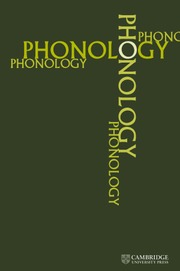Article contents
Ejective harmony in Lezgian
Published online by Cambridge University Press: 11 September 2018
Abstract
This paper contributes to the typology of laryngeal harmony by analysing an unusual case of long-distance laryngeal co-occurrence restrictions and alternations in Lezgian. This pattern, previously unmentioned in the phonological literature, is the first known case of alternations involving ejective harmony. In Lezgian, local processes mask the interaction of ejectives and plain voiceless stops. This is robustly supported by our dictionary analysis, which reveals a ban on the co-occurrence of ejectives and plain voiceless stops within the foot. Both harmony alternations and static co-occurrence restrictions are sensitive to foot structure, unlike previous cases of consonant harmony. Harmony also interacts opaquely with vowel syncope, and certain co-occurrences of plain and ejective stops are resolved with dissimilation rather than harmony, showing a conspiracy to avoid co-occurrences. We demonstrate an account within the Agreement by Correspondence framework and discuss implications for the typology and analysis of consonant harmony.
- Type
- Articles
- Information
- Copyright
- Copyright © Cambridge University Press 2018
References
- 2
- Cited by


